|
|
|
Sort Order |
|
|
|
Items / Page
|
|
|
|
|
|
|
| Srl | Item |
| 1 |
ID:
105148
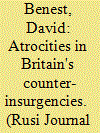

|
|
|
|
|
| Publication |
2011.
|
| Summary/Abstract |
The current scrutiny of British conduct in Afghanistan and Iraq in the wake of allegations of abuse of civilians has raised some troubling questions. But as a review of British history shows, from Northern Ireland to Kenya, atrocities and excesses are by no means a phenomenon unique to 'modern' small wars or today's generation of soldiers.
|
|
|
|
|
|
|
|
|
|
|
|
|
|
|
|
| 2 |
ID:
127811
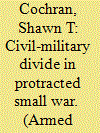

|
|
|
|
|
| Publication |
2014.
|
| Summary/Abstract |
This article examines the basis of military leadership preferences toward war termination, and thus the basis of the associated civil-military divide, within the context of protracted small war. The conventional wisdom posits military leadership preferences as a near-constant in favor of persistence and thus expects a dominant pattern of military obstructionism. However, such a pattern does not hold empirically across the population of small wars. This gap between expectation and evidence derives at least in part from the limits of the bureaucratic-organizational model, focused on the military's desire for resources, autonomy, and influence, that underlies the conventional wisdom. In contrast, this article suggests an alternative model privileging the demands of institutional legitimacy. The legitimacy motive as conceptualized here is particularly salient to the small war context. It accordingly provides a foundation for better understanding variation in military leadership preferences toward war termination and thus variation in the direction and intensity of the civil-military divide.
|
|
|
|
|
|
|
|
|
|
|
|
|
|
|
|
| 3 |
ID:
093923
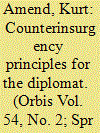

|
|
|
|
|
| Publication |
2010.
|
| Summary/Abstract |
The recent resurgence of interest in insurgency and counterinsurgency has revealed a deficit in material written by and for the diplomat, the actor ostensibly responsible for the political component of a counterinsurgency campaign. Classical theorists stress that progress along the political track is essential for ultimate success. Recent commentary, in shedding new light on the characteristics of modern insurgencies, reaffirms this principle. To make political headway the diplomat-counterinsurgent needs to develop a strategic narrative, build a political strategy around the narrative, acquire expertise, become a catalyst for political change, and maximize contact with the local population. In doing so, he will make important contributions to and help accelerate success in a counterinsurgency campaign.
|
|
|
|
|
|
|
|
|
|
|
|
|
|
|
|
| 4 |
ID:
145673
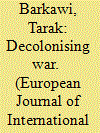

|
|
|
|
|
| Summary/Abstract |
What would it mean to decolonise the concept of war? ‘Decolonising’ means critiquing the ways in which Eurocentric ideas and historiographies have informed the basic categories of social and political thought. Dominant understandings of the concept of war derive from histories and sociologies of nation-state formation in the West. Accordingly, I critique this Eurocentric concept of war from the perspective of Small War in the colonies, that is, from the perspective of different histories and geographies of war and society than were assumed to exist in the West. I do so in order to outline a postcolonial concept of war and to identify some of the principles of inquiry that would inform a postcolonial war studies. These include conceiving force as an ordinary dimension of politics; situating force and war in transnational context, amid international hierarchies; and attending to the co-constitutive character of war and society relations in world politics.
|
|
|
|
|
|
|
|
|
|
|
|
|
|
|
|
| 5 |
ID:
096508
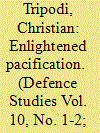

|
|
|
| 6 |
ID:
133512
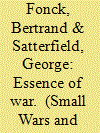

|
|
|
|
|
| Publication |
2014.
|
| Summary/Abstract |
In the late seventeenth century during the Dutch War (1672-1678) and the Nine Years War (1688-1697), French armies relied on small war for the accomplishment of essential tasks and as part of an overall strategy of exhausting their opponents in the Low Countries. The purposes of small war included the imposition of contributions on enemy populations, the destruction of the enemy base of operations, blockades of fortresses, and the general support of campaign armies. The expression 'small war' in the French language appeared with growing frequency in the 1690s. Small war can be viewed as both a cause and consequence of the characteristics of these wars. The limited policy goals of Louis XIV the king of France required a strategy that minimised risk and accomplished the goal of reducing if not eliminating the Spanish presence in the Low Countries that bordered the north of France. As French armies increased in size during this period, the demand for specialists at small increased in order to provide security and ensure supply. Small war in the late seventeenth century was thus not ideologically motivated insurgency, but in the minds of French commanders an essential component of strategy and the nature of war.
|
|
|
|
|
|
|
|
|
|
|
|
|
|
|
|
| 7 |
ID:
100940
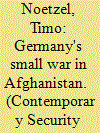

|
|
|
|
|
| Publication |
2010.
|
| Summary/Abstract |
The article analyzes the operational conduct of German forces in northern Afghanistan and the making of German strategy in the context of the International Security Assistance Force (ISAF) since the expansion of the Afghan insurgency to northern Afghanistan in 2007. It is argued that the German contribution to ISAF is characterized by a severe mismatch between politico-strategic planning and decision-making in Berlin on the one hand and operational conduct and requirements on the ground on the other. Since 2007, however, politico-strategic insistence that the German engagement in Afghanistan constitutes a contribution to a post-conflict stabilization and reconstruction effort is steadily eroding. Analysis of German operational conduct in northern Afghanistan makes evident the existing mismatch between strategy and operations, but also reveals that the deterioration of the security situation on the ground has lead to a bottom-up-development of counterinsurgency doctrine, capabilities, institutions, and modus of operandi. Operations have been driving the making of German strategy, not vice-versa, which has severely hampered German efforts to counter insurgents' progress in the north of Afghanistan.
|
|
|
|
|
|
|
|
|
|
|
|
|
|
|
|
| 8 |
ID:
133515
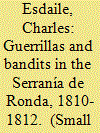

|
|
|
|
|
| Publication |
2014.
|
| Summary/Abstract |
The Spanish Guerrilla (1808-1812) which has given its name to ideologically motivated insurgencies is usually portrayed as a patriotic uprising against the French occupation forces of Napoleon. It was that, in part, but also many other things besides. This case study illustrates its overlap and convergence with banditry but also with social unrest turned into uprisings directed by poor Spaniards against their creditors, as in the storming of Ronda by insurgents in 1810. From the propaganda of the day to the subsequent Spanish patriotic historiography, there has been a tendency to exaggerate the amplitude of events and also the damage that was done to the French forces and the casualty figures inflicted on them.
|
|
|
|
|
|
|
|
|
|
|
|
|
|
|
|
| 9 |
ID:
133514
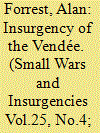

|
|
|
|
|
| Publication |
2014.
|
| Summary/Abstract |
The insurrection in the Vendée combined open warfare with the methods of petite guerre, ambushing French republican soldiers and cutting their supply lines to Paris. These tactics, when combined with the hatreds generated by a civil war, go far to explain to the cruelty of the conflict in the west and the depth of the hatreds it engendered. In republican eyes the use of guerrilla tactics was unjust and illegitimate, and they denounced their adversaries as common criminals and brigands, portraying them as backward, superstitious, even as subhuman, and in the process justified the savage repression they unleashed against them.
|
|
|
|
|
|
|
|
|
|
|
|
|
|
|
|
| 10 |
ID:
133510
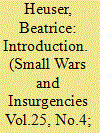

|
|
|
|
|
| Publication |
2014.
|
| Summary/Abstract |
When twentieth-century authors wrote about 'partisan warfare', they usually meant an insurgency or asymmetric military operations conducted against a superior force by small bands of ideologically driven irregular fighters. By contrast, originally (i.e. before the French Revolution) 'partisan' in French, English, and German referred only to the leader of a detachment of special forces (party, partie, Parthey, détachement) which the major European powers used to conduct special operations alongside their regular forces. Such special operations were the classic definition of 'small war' (petite guerre) in the late seventeenth and in the eighteenth centuries. The Spanish word 'la guerrilla', meaning nothing other than 'small war', only acquired an association with rebellion with the Spanish War of Independence against Napoleon. Even after this, however, armies throughout the world have continued to employ special forces. In the late nineteenth century, their operations have still been referred to as prosecuting 'la guerrilla' or 'small war', which existed side by side with, and was often mixed with, 'people's war' or popular uprisings against hated regimes.
|
|
|
|
|
|
|
|
|
|
|
|
|
|
|
|
| 11 |
ID:
139102
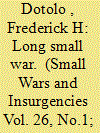

|
|
|
|
|
| Summary/Abstract |
The paper argues that the success of the Italian pacification campaign of Libya in 1932 can be traced to the implementation of a military-centric strategy used in counterrevolutionary warfare, a type of Small War made popular in the early twentieth century and an older form of counterinsurgency. Rather than focus on achieving an acceptable level of security common to modern counterinsurgency doctrine, COIN, the Italians used kinetic military operations to defeat and subdue rebel groups in the two Libyan colonies of Tripolitania and Cyrenaica. The roots of third rebellion, and the military strategy used to pacify the colonies, were developed during the guerrilla war by Ottoman and indigenous groups used to oppose the Italian invasion of Libya during the Italo-Libyan War, 1911–1912. The lessons of Italy's success should make the application of a military-centric rather than a security-centric strategy useful for current counterinsurgencies.
|
|
|
|
|
|
|
|
|
|
|
|
|
|
|
|
| 12 |
ID:
107897
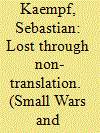

|
|
|
|
|
| Publication |
2011.
|
| Summary/Abstract |
While Carl von Clausewitz has generally been respected as one of the most profound philosophers of war, his expertise has been regarded as somewhat limited if not even irrelevant to the so-called 'new wars' of the post-Cold War world. Many scholars in international relations have claimed that 'new wars' are essentially 'post-Clausewitzian' and 'post-trinitarian' in nature, meaning that they are no longer fathomable through a Clausewitzian framework. However Clausewitz's earlier writings were nearly exclusively dedicated to guerrilla warfare, or what he called 'small wars'. These writings have been largely overlooked by many analysts of contemporary conflicts. By drawing on his rare and untranslated writings, the article uncovers a critical part of Clausewitz's expertise in asymmetric warfare and shows that, far from being irrelevant in an age where interstate warfare is increasingly being replaced by conflicts between states and semi-/non-state actors, Clausewitz's philosophical writings actually shed new light into the particular interactive dynamics generated during wars waged under conditions of asymmetry.
|
|
|
|
|
|
|
|
|
|
|
|
|
|
|
|
| 13 |
ID:
093026
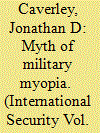

|
|
|
|
|
| Publication |
2009.
|
| Summary/Abstract |
A capital- and firepower-intensive military doctrine is, in general, poorly suited for combating an insurgency. It is therefore puzzling that democracies, particularly the United States, tenaciously pursue such a suboptimal strategy over long periods of time and in successive conflicts. This tendency poses an empirical challenge to the argument that democracies tend to win the conflicts they enter. This apparently nonstrategic behavior results from a condition of moral hazard owing to the shifting of costs away from the average voter. The voter supports the use of a capital-intensive doctrine in conflicts where its effectiveness is low because the decreased likelihood of winning is out-weighed by the lower costs of fighting. This theory better explains the development of the United States' counterinsurgency strategy in Vietnam during Lyndon Johnson's administration compared to the dominant interpretation, which blames the U.S. military's myopic bureaucracy and culture for its counterproductive focus on firepower and conventional warfare.
|
|
|
|
|
|
|
|
|
|
|
|
|
|
|
|
| 14 |
ID:
133511
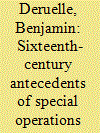

|
|
|
|
|
| Publication |
2014.
|
| Summary/Abstract |
The first conceptual, theoretical treatises about small war (la petite guerre) as special operations appeared only from the middle of the seventeenth century. The term is not used in the eighteenth-century sense of 'special operations' in older sources. The supposed absence of any treatment of the subject is surprising considering the obsession with the 'art of war' in the Renaissance, but other authors attribute it to a supposed antinomy between chivalric ideals and irregular warfare. But the absence of explicit manuals on the subject is not evidence of absence of advanced reflection on this kind of operations in the Middle Ages and in Early Modern times. We should thus look elsewhere, in other genres, for writings that contain and pass on military knowledge. Epics, romances, educational and military treatises, and memoirs in fact contain elements of a theory of special operations, even though these genres differ from our conception of rationality inherited from the Enlightenment.
|
|
|
|
|
|
|
|
|
|
|
|
|
|
|
|
| 15 |
ID:
146948
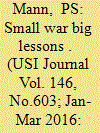

|
|
|
| 16 |
ID:
111714


|
|
|
| 17 |
ID:
130864
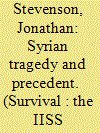

|
|
|
|
|
| Publication |
2014.
|
| Summary/Abstract |
If Washington's Syria policy succeeds, it will crystallise efforts to privilege diplomacy over the use of force and create a precedent other powers will be apt to follow. The United States' present Syria policy is perhaps the most vivid, and discomfiting, example of the Obama administration's realism. Its military forbearance, even in the face of a burgeoning humanitarian crisis (over 150,000 Syrians have died in just over three years) and the Assad regime's use of chemical weapons, has been resolute. Its focus on using diplomacy instead of military power has been firm, if vexing. These traits suggest three strategic clean breaks from the George W. Bush administration's post-9/11 policy. Firstly, they imply recognition by the US that major wars remain possible and cannot be subordinated to 'small wars' of choice. Secondly, they indicate that the counter-insurgency tools developed for expeditionary deployments to Iraq and Afghanistan have been rejected as instruments of policy. Thirdly, they subsume a determined effort at rapprochement with Iran and, more broadly, an approach to Middle Eastern affairs that is substantially less confrontational and heavy-handed.
|
|
|
|
|
|
|
|
|
|
|
|
|
|
|
|
| 18 |
ID:
131689
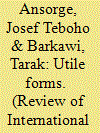

|
|
|
|
|
| Publication |
2014.
|
| Summary/Abstract |
This article introduces the concept of 'utile forms' and analyses the effects of these forms in imperial rule and contemporary counterinsurgency. Utile forms are media that enable bureaucracies to disseminate specialised knowledges to officials operating in the field. Examples include smart cards, field manuals, and handheld biometric devices. We argue that utile forms have significant social and political effects irrespective of the 'truth value' of the knowledge they contain. We analyse these effects in terms of world-ordering and world-making properties: utile forms both embody a particular worldview or ideology (world-ordering) and they facilitate official attempts to remake the world in accordance with this vision (world-making). We draw on examples of utile forms from British India and more recent conflicts in Iraq and Afghanistan. The article concludes by reflecting on the relations between truth, knowledge, and power in times of war and imperialism.
|
|
|
|
|
|
|
|
|
|
|
|
|
|
|
|
|
|
|
|
|